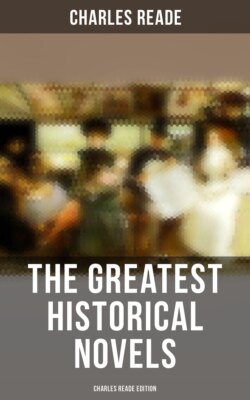Читать книгу The Greatest Historical Novels - Charles Reade Edition - Charles Reade Reade - Страница 84
На сайте Литреса книга снята с продажи.
CHAPTER LXXXI
ОглавлениеTable of Contents
THE HEARTH
“Eli,” said Catherine, “answer me one question like a man, and I'll ask no more to-day. What is wormwood?”
Eli looked a little helpless at this sudden demand upon his faculties; but soon recovered enough to say it was something that tasted main bitter.
“That is a fair answer, my man, but not the one I look for.”
“Then answer it yourself.”
“And shall. Wormwood is—to have two in the house a-doing nought, but waiting for thy shoes and mine,” Eli groaned. The shaft struck home.
“Methinks waiting for their best friend's coffin, that and nothing to do, are enow to make them worse than Nature meant. Why not set them up somewhere, to give 'em a chance?”
Eli said he was willing, but afraid they would drink and gamble their very shelves away.
“Nay,” said Catherine, “Dost take me for a simpleton? Of course I mean to watch them at starting, and drive them wi' a loose rein, as the saying is.”
“Where did you think of? Not here; to divide our own custom.”
“Not likely. I say Rotterdam against the world. Then I could start them.”
Oh, self-deception! The true motive of all this was to get near little Gerard.
After many discussions and eager promises of amendment on these terms from Cornelis and Sybrandt, Catherine went to Rotterdam shop-hunting, and took Kate with her; for a change, They soon found one, and in a good street; but it was sadly out of order. However, they got it cheaper for that, and instantly set about brushing it up, fitting proper shelves for the business, and making the dwelling-house habitable.
Luke Peterson was always asking Margaret what he could do for her. The answer used to be in a sad tone, “Nothing, Luke, nothing.”
“What, you that are so clever, can you think of nothing for me to do for you?”
“Nothing, Luke, nothing.”
But at last she varied the reply thus: “If you could make something to help my sweet sister Kate about.”
The slave of love consented joyfully, and soon made Kate a little cart, and cushioned it, and yoked himself into it, and at eventide drew her out of the town, and along the pleasant boulevard, with Margaret and Catherine walking beside. It looked a happier party than it was.
Kate, for one, enjoyed it keenly, for little Gerard was put in her lap, and she doted on him; and it was like a cherub carried by a little angel, or a rosebud lying in the cup of a lily.
So the vulgar jeered; and asked Luke how a thistle tasted, and if his mistress could not afford one with four legs, etc.
Luke did not mind these jeers; but Kate minded them for him.
“Thou hast made the cart for me, good Luke,” said she, “'Twas much. I did ill to let thee draw me too; we can afford to pay some poor soul for that. I love my rides, and to carry little Gerard; but I'd liever ride no more than thou be mocked fort.”
“Much I care for their tongues,” said Luke; “if I did care I'd knock their heads together. I shall draw you till my mistress says give over.
“Luke, if you obey Kate, you will oblige me.”
“Then I will obey Kate.”
An honourable exception to popular humour was Jorian Ketel's wife. “That is strength well laid out, to draw the weak. And her prayers will be your guerdon; she is not long for this world; she smileth in pain.” These were the words of Joan.
Single-minded Luke answered that he did not want the poor lass's prayers he did it to please his mistress, Margaret.
After that Luke often pressed Margaret to give him something to do—without success.
But one day, as if tired with his importuning, she turned on him, and said with a look and accent I should in vain try to convey:
“Find me my boy's father.”
